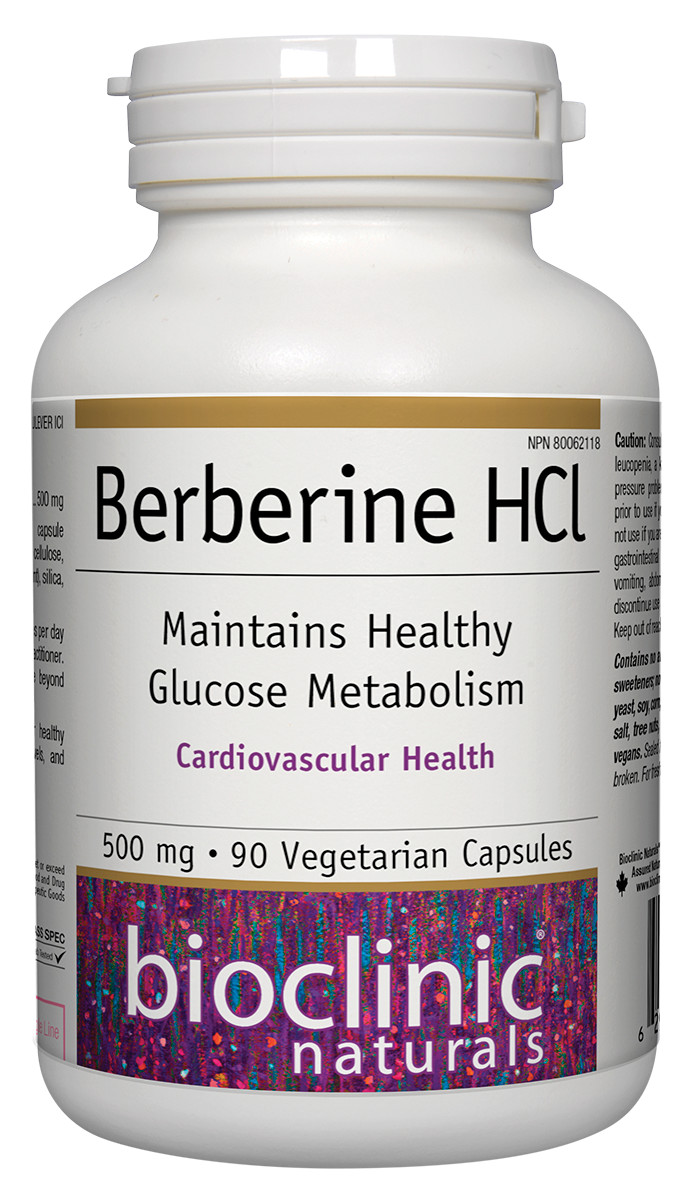
Maintains Healthy Glucose Metabolism
500 mg
90 Vegetarian Capsules ( SKU: 9231, NPN: 80062118 )
Benefits
- Provides 500 mg berberine HCl per capsule, the dosing strength used in clinical trials for glucose and lipid control
- Hypoglycemic effects via multiple mechanisms, including enhancement of insulin sensitivity
- Favourable effects on blood lipids, including a reduction in triglycerides, and both total and LDL cholesterol 9
- Activates Nrf-2, a key regulator of antioxidant gene transcription and prevention of glucose-induced neurotoxicity
- Extracted from Berberis vulgaris (European barberry)
- Suitable for vegetarians/vegans
Feature Summary
Traditionally used for gastrointestinal symptoms, berberine has emerged as a potent cardiometabolic aid with diverse benefits and mechanisms of action. It has hypoglycemic effects, via both an inhibition of alpha-glucosidase activity and an upregulation of insulin receptors in peripheral tissues, thereby improving insulin sensitivity.1,2 Furthermore, it activates Nrf2, a key regulator of cellular antioxidant defense, and attenuates glucose induced neurotoxicity, suggesting a therapeutic potential for diabetic neuropathy.3
In controlled trials it reduced HbA1c levels in diabetic participants with comparable efficacy to metformin. Among participants with the metabolic syndrome it has been shown to reduce waist circumference and body weight, blood pressure, triglycerides, and improve insulin resistance compared to placebo, with similar benefits in women with PCOS.4,5 Berberine targets multiple cardiometabolic risk factors, as it has been shown to also lower total and LDL cholesterol among diabetic participants in several controlled trials.6,7 Additionally, a clinical trial comparing standard therapy with or without berberine among patients receiving percutaneous coronary intervention showed improvements in multiple inflammatory markers, including C-reactive protein, IL-6, MMP-9, ICAM-1, and VCAM-1.8
Medicinal Ingredients
| Each Capsule Contains: | |
| Berberine (Hydrochloride) (Berberis vulgaris) (root) | 500 mg |
Non-Medicinal Ingredients
Vegetarian capsule (cellulose, purified water), microcrystalline cellulose, vegetable grade magnesium stearate (lubricant), silica, stearic acid.
Dosage:
1 capsule 2 times per day with meals or as directed by a health care practitioner. Consult a health care practitioner for use beyond 3 months.
Warnings:
Consult a health care practitioner if you have leucopenia, a kidney disorder, hypotension or blood pressure problems. Consult a health care practitioner prior to use if you have hypoglycemia or diabetes. Do not use if you are pregnant or breastfeeding. May cause gastrointestinal discomfort such as constipation, vomiting, abdominal pain or diarrhea, in which case discontinue use and consult a health care practitioner. Keep out of reach of children.
Allergens:
Contains no artificial colours, preservatives, or sweeteners; no dairy, starch, sugar, wheat, gluten, yeast, soy, corn, egg, fish, shellfish, animal products, salt, tree nuts, or GMOs. Suitable for vegetarians/vegans. Sealed for your protection. Do not use if seal is broken. For freshness, store in a cool, dry place.
Contraindications
Do not use if you are pregnant or breastfeeding.
Drug Interactions
Berberine has been shown to lower blood glucose levels, and may have an additive effect when combined with other hypoglycemic medications, such as metformin. Berberine has also been shown to increase levels of cylcosporin A, and combined use should be avoided.10 Berberine has demonstrated inhibitory activity on cytochrome enzymes CYP2D6, 3A4, and CYP2C9, and use of medications metabolized by these enzymes should be monitored.11
- Zhang, H., Wei, J., Xue, R., et al. (2010). Berberine lowers blood glucose in type 2 diabetes mellitus patients through increasing insulin receptor expression. Metabolism, 59(2), 285-92.
- Li, Z.Q., Zuo, D.Y., Qie, X.D., et al. (2012). Berberine acutely inhibits the digestion of maltose in the intestine. J Ethnopharmacol, 142(2), 474-80.
- Hsu, Y.Y., Tseng, Y.T., Lo, Y.C. (2013). Berberine, a natural antidiabetes drug, attenuates glucose neurotoxicity and promotes Nrf2-related neurite outgrowth. Toxicol Appl Pharmacol, 272(3), 787-96.
- Pérez-Rubio, K.G., González-Ortiz, M., et al. (2013). Effect of berberine administration on metabolic syndrome, insulin sensitivity, and insulin secretion. Metab Syndr Relat Disord, 11(5), 366-9.
- Wei, W., Zhao, H., Wang, A., et al. (2012). A clinical study on the short-term effect of berberine in comparison to metformin on the metabolic characteristics of women with polycystic ovary syndrome. Eur J Endocrinol, 166(1), 99-105.
- Yin, J., Xing, H., Ye, J. (2008). Efficacy of berberine in patients with type 2 diabetes mellitus. Metabolism, 57(5), 712-7.
- Zhang, Y., Li, X., Zou, D., et al. (2008). Treatment of type 2 diabetes and dyslipidemia with the natural plant alkaloid berberine. J Clin Endocrinol Metab, 93(7), 2559-65.
- Meng, S., Wang, L.S., Huang, Z.Q., et al. (2012). Berberine ameliorates inflammation in patients with acute coronary syndrome following percutaneous coronary intervention. Clin Exp Pharmacol Physiol, 39(5), 406-11.
- Dong, H., Zhao, Y., Zhao, L., et al. (2013). The effects of berberine on blood lipids: a systemic review and meta-analysis of randomized controlled trials. Planta Med, 79(6), 437-46.
- Xin, H.W., Wu, X.C., Li, Q., et al. (2006). The effects of berberine on the pharmacokinetics of cyclosporin A in healthy volunteers. Methods Find Exp Clin Pharmacol, 28(1), 25-9.
- Guo, Y., Chen, Y., Tan, Z.R., et al. (2012). Repeated administration of berberine inhibits cytochromes P450 in humans. Eur J Clin Pharmacol, 68(2), 213-7.
